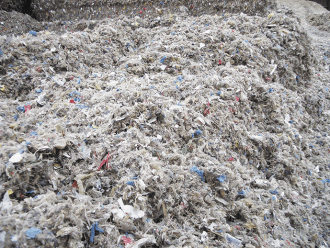 MRFs must invest in refuse-derived fuel alternatives to ensure a successful future, says Stephen Almond, sales engineer at TOMRA Sorting UK
MRFs must invest in refuse-derived fuel alternatives to ensure a successful future, says Stephen Almond, sales engineer at TOMRA Sorting UK
CIWM Journal Online Exclusive
 On first reading CIWM’s report on refuse-serived fuel (RDF) exports to other EU countries, I was struck by just how precarious and uneconomical the RDF process actually is for the long-term future of our waste management industry.
On first reading CIWM’s report on refuse-serived fuel (RDF) exports to other EU countries, I was struck by just how precarious and uneconomical the RDF process actually is for the long-term future of our waste management industry.
It doesn’t seem that long since RDF first appeared on the scene and was embraced by the waste management industry as a failsafe route to avoid expensive landfill costs by simply preparing, baling and exporting waste. But, as time has passed, it’s clear to see that RDF is certainly not the “quick fix” many had anticipated it to be. In fact, the feedback we regularly receive at TOMRA Sorting is that the reality is quite the opposite.
Figures from CIWM’s report show that whereas the cost of preparing residual waste for RDF appears low at €15-20 per tonne, the baling and wrapping, on-land transport, administration and port costs, sea transportation costs and gate fees increase this figure by a whopping €80-100 per tonne. Given these figures, it’s no surprise that many materials recycling facilities (MRFs) that have adopted RDF processes now say that it would often be cheaper to dispose of this material directly to landfill.
Costs aside, the biggest problem with RDF is, as CIWM’s report rightly highlights, the long-term viability of its export markets. Uncertainty concerning future restrictions on the export of material and potential over-saturation of the market, combined with increasing calls for an RDF tax, can only lead to a lack of guaranteed long-term contracts and even a potential risk of the market collapsing. You only have to look at the report’s figures outlining the huge percentage of RDF that is imported by the Netherlands to imagine the devastating implications should even this one country suddenly closed its doors to UK exports.
In Full Agreement
On a more positive note, at TOMRA we wholeheartedly agree with the CIWM report’s recommendation that “…the UK and Ireland should perhaps focus on extraction of high value recyclates which would have lower capital investment…. and lead to smaller exports to Europe.”
 Huge improvements have been made in sensor-based sorting technology, enabling MRFs to recover more and more valuable fractions than ever before. TOMRA’s TITECH technology, for example, can achieve a typical material purity rate of around 95 percent with a yield of up to 70 percent for valuable fractions such as plastics, films, paper, cardboard and wood. This represents a massive improvement on the 10-20 percent typically recovered by manual or semi-automated techniques.
Huge improvements have been made in sensor-based sorting technology, enabling MRFs to recover more and more valuable fractions than ever before. TOMRA’s TITECH technology, for example, can achieve a typical material purity rate of around 95 percent with a yield of up to 70 percent for valuable fractions such as plastics, films, paper, cardboard and wood. This represents a massive improvement on the 10-20 percent typically recovered by manual or semi-automated techniques.
If sensor-based sorting technology was adopted by more MRFs in the UK and Ireland, the only material that would need to be destined for the precarious RDF route would be the smallest amounts of residue after all valuable fractions had been recovered, leading to a much more stable outlook for the future.
My hope is that this CIWM report provides both the evidence and the incentive for the waste management industry to start investing in these more sustainable and better long-term alternatives to RDF, rather than continue to bet on risky quick fixes.
This article is a CIWM Journal Online exclusive and is similar to what you will find every month in the CIWM Journal. To receive this and have access to the archive, you must be a member. Click here to apply for membership now.